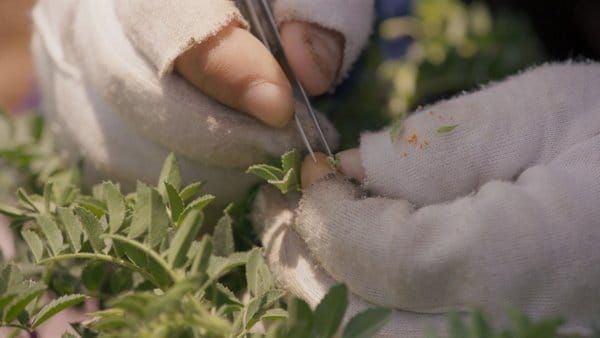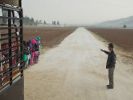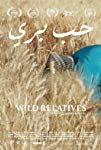Eye For Film >> Movies >> Wild Relatives (2017) Film Review
Wild Relatives
Reviewed by: Amber Wilkinson

Jumana Manna takes an immersive and humanistic approach to the subject of biodiversity and the threats to it in her latest documentary Wild Relatives. The film captures the work to preserve crop strains in the Global Seed Vault in Svalbard, Norway, in conjunction with farmers in Lebanon, who are attempting to recreate a gene bank left behind in Aleppo, Syria after the outbreak of the country's civil war.
Up close to the Arctic Circle and deep underground, we see Mad Max-like low-slung diggers cutting away at the rock, part of the complex where seeds are stored to be called upon in times of crisis. Meanwhile, thousands of miles away, female workers, many of whom we will learn are refugees, plant and pollinate seeds to replenish the stocks. Rather than rely on talking heads to explain what is happening, Manna sets up her film's conversation simply, outlining the work briefly, before showing us what is happening through the day to day lives of those in Norway and Lebanon over 12 months.

Along the way, we'll see women meticulously pollinating seeds by hand in the fields and hear conversations about the way that climate change is bringing new, unwelcome species interlopers to Svalbard. Manna nudges at the many unintended consequences of conflict, as we learn how "refugee business" is now more profitable than agriculture in Lebanon, as shelters for displaced people now blossom in fields that once held crops.
We are told all these things, not by the traditional format of serious talking heads, but in a more organic way. Manna and her cinematographer Marte Vold spend time with those involved in this precise but precarious business, often eavesdropping on conversations between people including a priest and a scientist and families, or simply watching the minutiae of the work that is being carried out.
There's not just information being imparted but a sense of Manna's artistic eye for interconnections, as these two very different worlds are brought together by images of nature and the weather.
The film is trim at 70 minutes and, almost inevitably, this leaves us wanting more detail on certain things. How is it that refugee women, in particular, have become so involved in the process of seed regeneration, for example? Background detail about ICARDA (International Center for Agricultural Research in the Dry Areas) - whose motto is, "Science for better lives in dry areas" - is also scant. We see what they do and, to an extent, why, but there's no real indication of its origins, structure of funding.
While the immersive technique used by the documentarian lends her film a directness, it also leaves holes in the information conveyed, but there is a sense that Manna is looking not to reap full answers as much as to sow questions in the mind of the viewer - about the situation in the Middle East and the West's influence, for good and ill, on that, and about the future of the planet. We are left to cultivate our own response.
Reviewed on: 02 Jan 2019
















